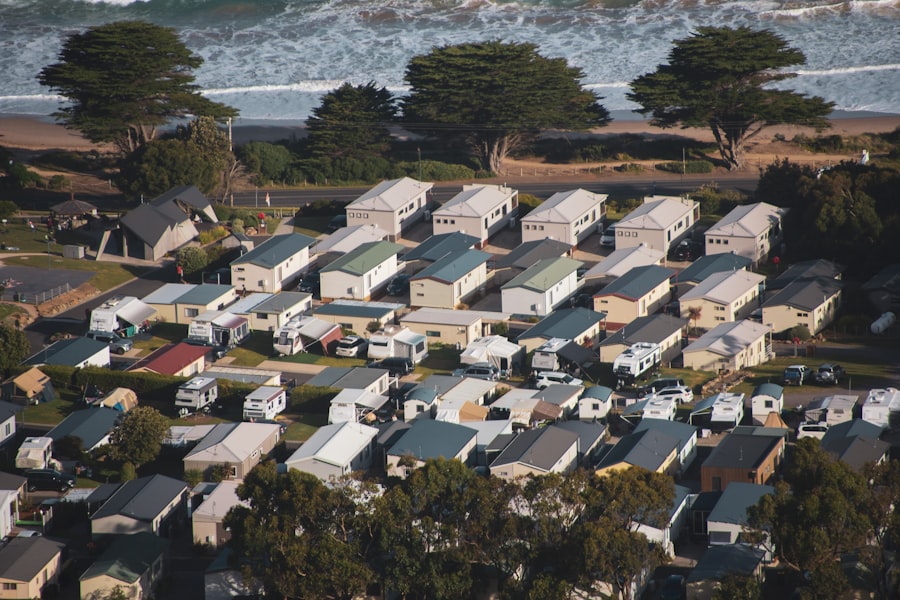Mobile home living offers a unique blend of affordability, flexibility, and community that appeals to a diverse range of individuals and families. One of the most significant advantages is the cost-effectiveness associated with purchasing and maintaining a mobile home. Compared to traditional houses, mobile homes typically come with a lower price tag, making homeownership accessible to those who might otherwise struggle to enter the real estate market.
This affordability extends beyond the initial purchase; mobile homes often incur lower property taxes and utility costs, allowing residents to allocate their finances toward other essential areas of life. In addition to financial benefits, mobile home living fosters a sense of community that is often hard to find in conventional neighborhoods. Many mobile home parks are designed with social interaction in mind, featuring communal spaces such as clubhouses, pools, and recreational areas.
This environment encourages residents to engage with one another, forming friendships and support networks that enhance the overall living experience. Furthermore, the mobility aspect of these homes allows for greater flexibility in lifestyle choices. Whether it’s relocating for a job opportunity or seeking a change of scenery, mobile homes provide the option to move without the extensive commitments associated with traditional homeownership.
Key Takeaways
- Mobile homes offer affordable and flexible living options with various benefits.
- Finding budget-friendly mobile homes involves researching listings and considering location.
- Financing tips include exploring loans specifically designed for mobile home purchases.
- Key considerations when buying include condition, community rules, and long-term costs.
- Upgrading and customizing mobile homes can enhance comfort and increase value.
Finding Affordable Mobile Homes for Sale
The search for affordable mobile homes can be both exciting and daunting, but with the right approach, prospective buyers can navigate the market effectively. One of the first steps is to explore online platforms that specialize in mobile home listings. Websites such as Zillow, Realtor.com, and specialized mobile home sites like MHBay.com offer extensive databases of available properties.
These platforms allow users to filter searches based on price, location, size, and other criteria, making it easier to find homes that fit specific needs and budgets. In addition to online resources, local real estate agents who specialize in mobile homes can provide invaluable assistance. These professionals possess in-depth knowledge of the local market and can help identify hidden gems that may not be widely advertised.
Attending local real estate expos or community events can also yield opportunities to connect with sellers directly. Networking within local communities or joining online forums dedicated to mobile home living can lead to discovering homes for sale through word-of-mouth referrals, which often come with less competition than traditional listings.
Tips for Financing a Mobile Home Purchase

Financing a mobile home purchase can differ significantly from securing a mortgage for a traditional house. One key consideration is whether the mobile home will be classified as personal property or real estate. If the home is placed on a permanent foundation and the land is owned, it may qualify for conventional financing options.
However, if the home is situated in a mobile home park or on rented land, buyers may need to explore alternative financing methods such as personal loans or chattel loans specifically designed for mobile homes. When seeking financing, it’s crucial to shop around for the best interest rates and terms. Many lenders offer specialized loans for mobile homes, so comparing offers from multiple institutions can lead to significant savings over time.
Additionally, improving one’s credit score before applying for financing can enhance eligibility for better loan terms. Prospective buyers should also consider their budget carefully, factoring in not just the monthly mortgage payments but also insurance, maintenance costs, and potential lot fees if applicable.
What to Consider When Buying a Mobile Home
| Consideration | Description | Key Metrics | Importance Level |
|---|---|---|---|
| Budget | Determine your total budget including purchase price, taxes, and setup costs. | Purchase price, Setup fees, Taxes | High |
| Location | Choose a location with good amenities, safety, and accessibility. | Proximity to schools, hospitals, shopping centers | High |
| Size and Layout | Consider the number of bedrooms, bathrooms, and overall square footage. | Square footage, Number of rooms | Medium |
| Quality and Age | Check the build quality and age of the mobile home for durability. | Year built, Material quality ratings | High |
| Financing Options | Explore available loans or financing plans for mobile homes. | Interest rates, Loan terms | Medium |
| Community Rules | Understand the rules and regulations of the mobile home park or community. | Pet policies, Maintenance fees | Medium |
| Resale Value | Consider the potential resale value and market demand. | Depreciation rate, Market trends | Low |
| Utilities and Infrastructure | Check availability and condition of utilities like water, electricity, and sewage. | Utility connection fees, Infrastructure age | High |
| Inspection and Warranty | Get a professional inspection and inquire about warranties. | Inspection report, Warranty duration | High |
When purchasing a mobile home, several critical factors warrant careful consideration to ensure a satisfactory investment. First and foremost is the condition of the home itself. Prospective buyers should conduct thorough inspections to assess structural integrity, plumbing, electrical systems, and overall maintenance needs.
Engaging a professional inspector who specializes in mobile homes can provide insights into potential issues that may not be immediately visible. Another important aspect is understanding the regulations and restrictions associated with mobile home living. Different parks have varying rules regarding pets, landscaping, and modifications to the home.
Buyers should familiarize themselves with these regulations before committing to a purchase to avoid future conflicts or dissatisfaction. Additionally, considering the long-term implications of location is vital; proximity to schools, healthcare facilities, shopping centers, and public transportation can significantly impact daily life and resale value.
The Best Locations for Affordable Mobile Homes
Identifying the best locations for affordable mobile homes involves balancing cost with quality of life considerations. Many buyers find that rural or suburban areas offer more affordable options compared to urban centers where real estate prices are inflated. States like Texas, Florida, and Arizona are known for their welcoming climates and have numerous mobile home parks that cater to various demographics, from retirees seeking tranquility to families looking for community-oriented environments.
Moreover, proximity to amenities plays a crucial role in determining an ideal location. Areas with access to parks, recreational facilities, shopping centers, and healthcare services enhance the appeal of mobile home living. Additionally, regions with strong job markets can provide stability for residents who may be concerned about employment opportunities.
Researching local school districts is also essential for families; areas with reputable schools can significantly influence property values and community desirability.
How to Negotiate the Best Deal on a Mobile Home

Negotiating the price of a mobile home requires a strategic approach that combines research with effective communication skills. Before entering negotiations, buyers should conduct thorough market research to understand comparable sales in the area. This knowledge empowers buyers to make informed offers based on fair market value rather than emotional impulses.
Additionally, being aware of any repairs or issues identified during inspections can serve as leverage during negotiations. Establishing rapport with the seller can also facilitate smoother negotiations. Approaching discussions with respect and understanding can create a more collaborative atmosphere.
Buyers should be prepared to articulate their position clearly while remaining open to compromise. Offering flexible closing dates or being willing to take on minor repairs can sometimes persuade sellers to lower their asking price or include additional perks such as appliances or furniture.
Upgrading and Customizing Your Affordable Mobile Home
One of the appealing aspects of mobile home living is the potential for customization and upgrades that reflect personal style and preferences. Many homeowners choose to enhance their spaces by making aesthetic improvements such as painting walls, updating flooring, or installing new fixtures. These changes not only improve the visual appeal of the home but can also increase its overall value.
Beyond cosmetic upgrades, homeowners may consider more substantial renovations that enhance functionality or energy efficiency. Installing energy-efficient windows or upgrading insulation can lead to significant savings on utility bills over time. Additionally, creating outdoor living spaces such as decks or patios can expand usable square footage and provide enjoyable areas for relaxation or entertaining guests.
Engaging with local contractors who specialize in mobile home renovations can help ensure that upgrades are completed efficiently and meet safety standards.
The Future of Affordable Mobile Home Living
The future of affordable mobile home living appears promising as societal trends shift toward more sustainable and flexible housing solutions. With rising housing costs in urban areas pushing many individuals toward alternative living arrangements, mobile homes present an attractive option that aligns with these changing dynamics. As more people prioritize affordability without sacrificing quality of life, demand for mobile homes is likely to increase.
Moreover, advancements in technology are paving the way for innovative designs and construction methods in the mobile home industry. Manufacturers are increasingly focusing on energy-efficient materials and smart home technologies that appeal to environmentally conscious consumers. As these trends continue to evolve, mobile homes may become even more desirable as they offer modern amenities while maintaining affordability.
The growing acceptance of alternative housing solutions suggests that mobile home living will remain a viable option for those seeking affordable housing in an ever-changing economic landscape.



